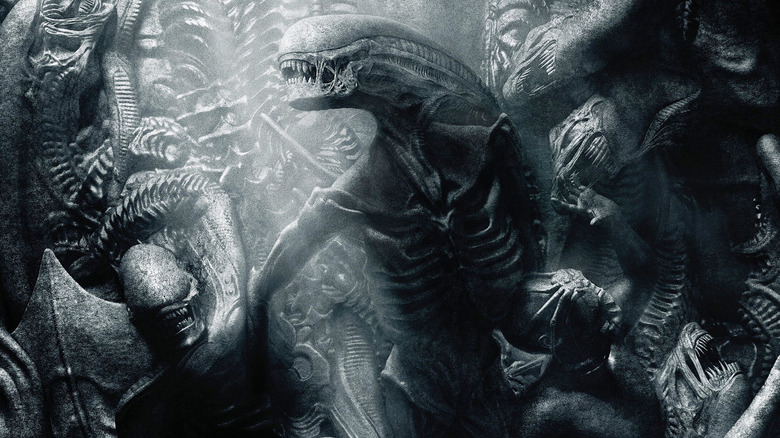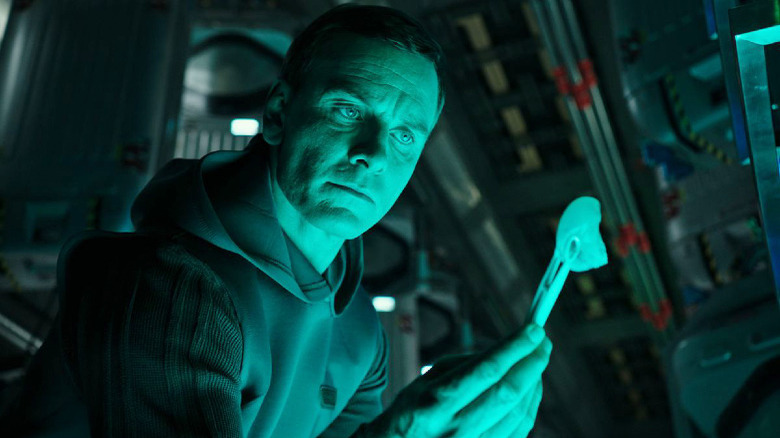Noah Hawley Alien Series Is 'Going Slowly,' Will Be Built Around Corporate Warfare
Tragically, it seems Ridley Scott will never get to finish his "Alien" prequel film trilogy, between the second entry, "Alien: Covenant," disappointing at the box office and Disney setting the franchise on a different course after buying Fox's media assets in 2019. Still, while we may've seen the last of everyone's favorite murderous android David, that doesn't mean the property is dead in the water. On the contrary, "Fargo" and "Legion" showrunner Noah Hawley is plugging away on an "Alien" series for FX, and it looks to carry over many of the same themes about artificial intelligence and human arrogance that Scott zeroed in on with his prequel movies, starting with "Prometheus."
In an interview with Esquire, Hawley affirmed some comments that FX Chairman John Landgraf made about the "Alien" show, where he described it as "a really big world-building exercise." No stranger to playing in massive sandboxes (see: "Legion" and the "X-Men" property) or putting his stamp on a fictional world he didn't come up with (see: "Fargo"), Hawley had the following to say about the series' current status:
"It's going great. It's going slowly, unfortunately, given the scale of it. I've made a certain business out of reinvention. Alien is a fascinating story because it's not just a monster movie; it's about how we're trapped between the primordial past and the artificial intelligence of our future, where both [are] trying to kill us. It's set on Earth of the future. At this moment, I describe that as Edison versus Westinghouse versus Tesla. Someone's going to monopolize electricity. We just don't know which one it is."
Does Humanity Deserve to Survive?
His statement aligns with Hawley's past comments about his series and how it both will and won't differ from the "Alien" movies. Sigourney Weaver may not be coming back as Ellen Ripley, but the show will carry over the "themes about inequality" from Scott's original 1979 sci-fi horror classic, according to Hawley. The series will also focus more on the Weyland-Yutani Corporation, which has functioned primarily as the unseen puppet master pulling the strings on other characters (namely, corporate lackeys like Carter Burke from "Aliens") in the "Alien" films released so far. As Hawley put it:
"In the movies, we have this Weyland-Yutani Corporation, which is clearly also developing artificial intelligence — but what if there are other companies trying to look at immortality in a different way, with cyborg enhancements or transhuman downloads? Which of those technologies is going to win? It's ultimately a classic science fiction question: does humanity deserve to survive? As Sigourney Weaver said in that second movie, 'I don't know which species is worse. At least they don't f*** each other over for a percentage.' Even if the show was 60% of the best horror action on the planet, there's still 40% where we have to ask, "What are we talking about it, beneath it all?" Thematically, it has to be interesting. It's humbling to get to play with the iconography of this world."
Hawley's certainly setting a high bar to clear for himself, not least of all coming on the heels of Scott's "Alien" prequel movies. (For all their flaws, those films began to evolve the franchise thematically in fascinating ways.) Personally, though, I'm a little wary. Hawley's work is never lacking for ambition, yet more and more over the years he's tended to allow stylistic flourishes to take precedent over coherent storytelling that fleshes out his big ideas — something he was especially guilty of doing with his feature directing debut, "Lucy in the Sky." All the same, his "Alien" series is definitely a project worth keeping an eye on, the way it's shaping up.

